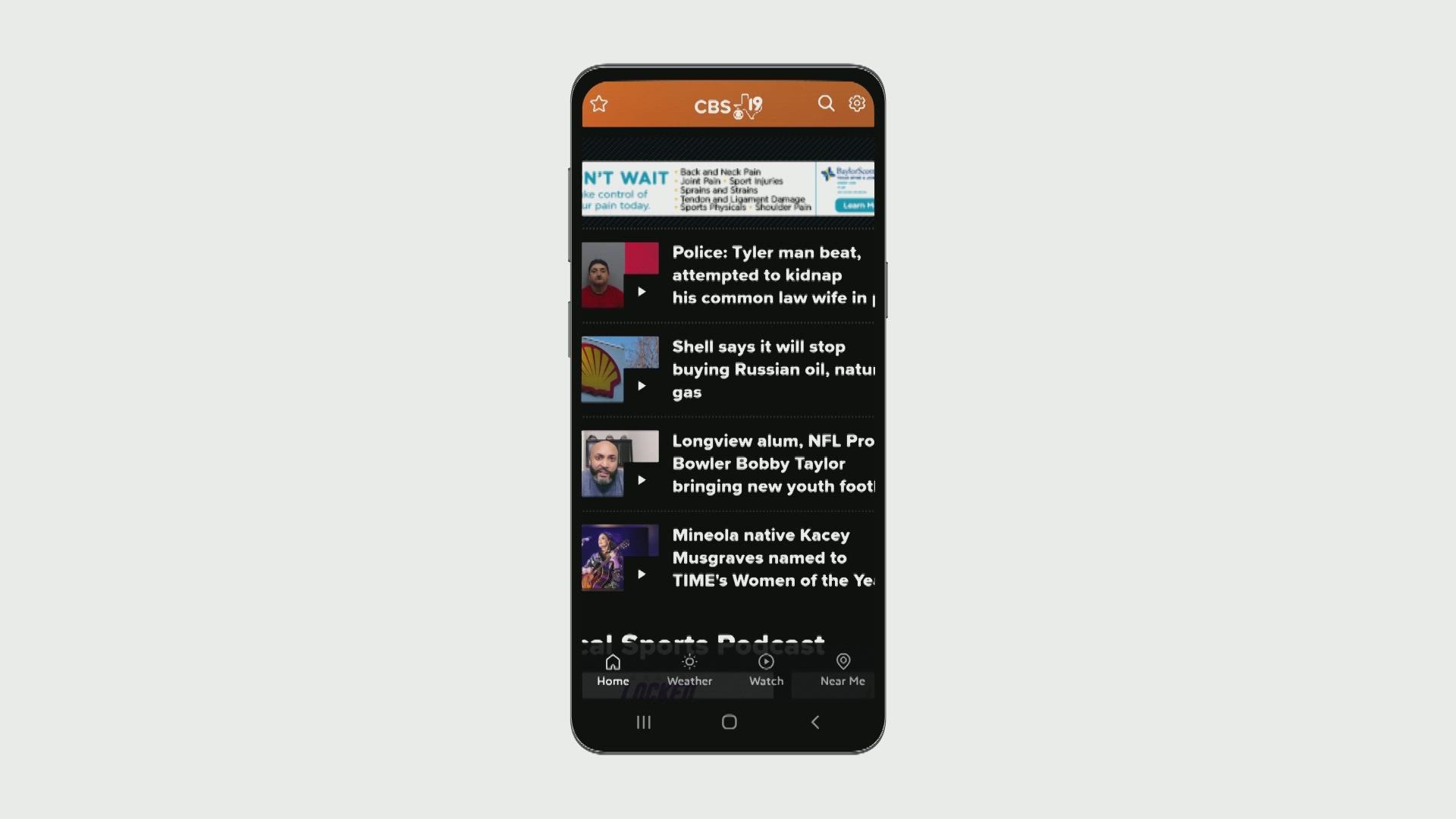After the first presumptive case of COVID-19 was reported in the state of Oregon in February 2020, Steve LaTulippe, M.D., was seeing patients at his family practice clinic in Dallas, Oregon. His wife also worked with him, fielding calls and directing patients to exam rooms.
According to the Oregon Medical Board, from March through December 2020, LaTulippe and his staff didn’t follow standard state COVID-19 protocols or CDC guidelines in his clinic. They rarely wore masks and only advised patients to wear masks if they were “acutely ill, coughing, or congested.” They also didn’t practice required pre-visit screens and did not follow social distancing guidelines.
LaTulippe had a general opposition to mask-wearing, the board said, and he often told his patients masks were ineffective in preventing the spread of COVID-19. He and his wife directed patients to YouTube videos containing disinformation and misinformation about mask-wearing.
Both misinformation and disinformation can deceive someone – misinformation can be shared unintentionally, while disinformation is shared deliberately with the intent to deceive.
A board investigator visited LaTulippe’s clinic and found articles containing false information about COVID-19 posted as bulletins. Records show the investigator observed no protocols, such as mask-wearing or social distancing, in place to protect doctors, staff or patients from the spread of COVID-19. For those violations and others, the Oregon Medical Board suspended LaTulippe’s medical license in December 2020 and then revoked it in September 2021.
LaTullipe’s clinic wasn’t his only platform for spreading misinformation. His Twitter account has been suspended for violating Twitter rules. On Gettr, a social networking site, he has shared links to blog posts that contain anti-vaccine sentiment or link the COVID-19 pandemic to population control.
LaTulippe is just one of the many doctors who has engaged in spreading false information during the coronavirus pandemic.
An in-depth VERIFY report found that even though a small percentage of medical professionals have been accused of spreading misinformation, medical misinformation from doctors has had an outsized impact.
For doctors who have spread misinformation, state medical boards have little recourse since in most cases, an investigation can't be launched until a complaint is filed. There are no state or federal laws that criminally penalize a physician for spreading false information. In addition, social media networks have difficulty policing the rampant spread of misinformation on their platforms, fueled in part by some medical professionals.
OUR SOURCES
- The American Medical Association
- Centers for Disease Control and Prevention
- Medical board statements from 23 U.S. states
- COVID States Project
- The de Beaumont Foundation
- U.S. Surgeon General Vivek Murthy
- Ciaran O’Connor, analyst with the Institute for Strategic Dialogue
- David Morens, M.D., senior advisor to the director, National Institute of Allergy and Infectious Diseases
UNDERSTANDING THE HARMFUL EFFECTS OF MEDICAL MISINFORMATION
According to data from the Centers for Disease Control and Prevention (CDC), as of April 19, 70.1% of the eligible U.S. population has been fully vaccinated against COVID-19.
CDC data show from April 2021 through Feb. 1, 2022, nearly 120 million people were vaccinated against COVID-19, and about 52 million were not. During that time, 134,431 (.25%) unvaccinated people died and 43,654 (.03%) fully vaccinated people died. Adults who are fully vaccinated are 94% less likely to be put on a ventilator or die compared to those who are unvaccinated, the CDC found.
One factor that influences vaccine hesitancy is misinformation. A survey published by COVID States Project found that around 16% of Americans still believe some false statements about the COVID-19 vaccine.
COVID States Project is a group of university researchers who aim to identify links between social behaviors and virus transmission. The group surveyed 18,782 people between Dec. 22, 2021, and Jan. 24, 2022. Respondents were from all 50 states and Washington, D.C.

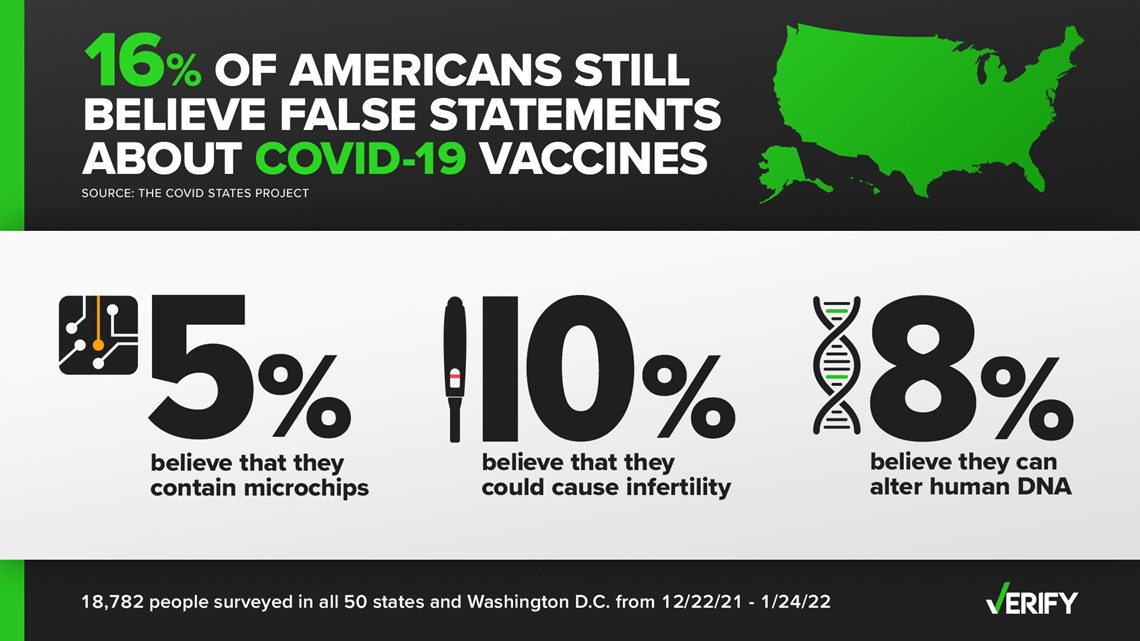
As of January 2022, about 5% of survey respondents thought vaccines contained microchips, 8% believed vaccines could alter human DNA, and 10% were concerned that vaccines could cause infertility, according to the survey. Close to half of respondents, 46%, reported being uncertain whether at least one of those claims was true.
All of those claims have been proven to be false.
Holding misperceptions and being uncertain about viral claims are linked to higher levels of vaccine hesitancy and resistance, the COVID States Project researchers found.
Ciaran O’Connor, an analyst with the Institute for Strategic Dialogue, told VERIFY when doctors are the ones spreading misinformation online, it attaches a degree of credibility, which makes it harder to distinguish what is true or false.
“Remember, these are people who are trying to live their normal life, perhaps they've been furloughed, or perhaps their job became more precarious at the beginning of COVID-19. And they're just worried, they're anxious. And here comes a claim, or here comes a source of information or post that you just see scrolling online … It's impossible to judge all of these to a critical level,” O’Connor said.
A survey from the de Beaumont Foundation, a charitable foundation that focuses on health policy, found a majority of individuals surveyed believe health professionals should face consequences for spreading false claims.
Of 2,200 adults surveyed, 78% said medical doctors who intentionally spread misinformation about COVID-19 should be disciplined, whether it be warnings, fines, license suspension or revocation. Eighty-three percent of individuals surveyed said the physician’s responsibility to share credible information with their patients and the public outweighs their protected right to speech. Of those surveyed, 91% said doctors don’t have the right to intentionally spread misinformation or false health information.
But VERIFY found states have difficulty cracking down on medical misinformation or even spotting it at all.
TAKING ACTION: DISCIPLINING DOCTORS ISN’T EASY
There are currently no state or federal laws in place that would criminally penalize doctors for spreading false information, but their medical licenses could be at risk if a doctor doesn’t follow the American Medical Association Principles of Medical Ethics.
Several doctors penned an article in the American Medical Association’s Journal of Ethics on the topic of how governments can regulate health-related speech, especially when it comes to health-related misinformation or disinformation.
“While the government has some powers to regulate health-related speech, those powers are very limited and are not comprehensive or consistent. Recognizing the constitutional limits on the government’s powers to regulate private citizens’ free speech in the public sphere, we suggest that government regulation cannot be expected to resolve the problem of false and harmful health-related information that is perpetuated on the internet by private citizens who are speaking with their private citizen rather than their professional ‘hat’ on. Furthermore, the government cannot be relied upon to be the sole speaker of truthful and accurate health information,” the article said.
Some federal lawmakers have made attempts to curb the spread of medical misinformation and hold those accountable who have allowed it to spread.
In October 2021, Rep. James E. Clyburn (D-S.C.), chairman of the Select Subcommittee on the Coronavirus Crisis, launched an investigation into online platforms, such as America’s Frontline Doctors, that have been accused of spreading misinformation. In February 2022, the subcommittee announced the investigation would be expanded to include efforts by companies promoting and profiting off of coronavirus misinformation. The subcommittee investigation is ongoing.
Senators Amy Klobuchar (D-Minn.) and Ben Ray Luján (D-N.M.) introduced the Health Misinformation Act of 2021 in July 2021, calling for social media companies to be held accountable for medical misinformation. There has been no action on the proposed legislation since it was introduced to the Senate.
At the state level, state medical boards are responsible for licensing doctors, investigating complaints and disciplining those who violate the Medical Practice Act, according to the American Medical Association. The Medical Practice Act outlines rules that regulate the practice of medicine, including the licensure and discipline of physicians, in a state.
The specific standards for violations vary by state and each state has their own version of the Medical Practice Act. According to the AMA, the regulations are laid out under a state statute, and state medical boards establish the standards for the profession through their interpretation and enforcement of this act.
VERIFY reached out to the state medical board in every U.S. state to learn more about their processes when a doctor within the jurisdiction is actively spreading disinformation or misinformation.
Twenty-three states responded. Each board representative told VERIFY they operate under a complaint-driven approach, meaning that someone would have to submit a complaint to the board, which would then be reviewed and, if deemed appropriate, disciplinary action could be recommended.

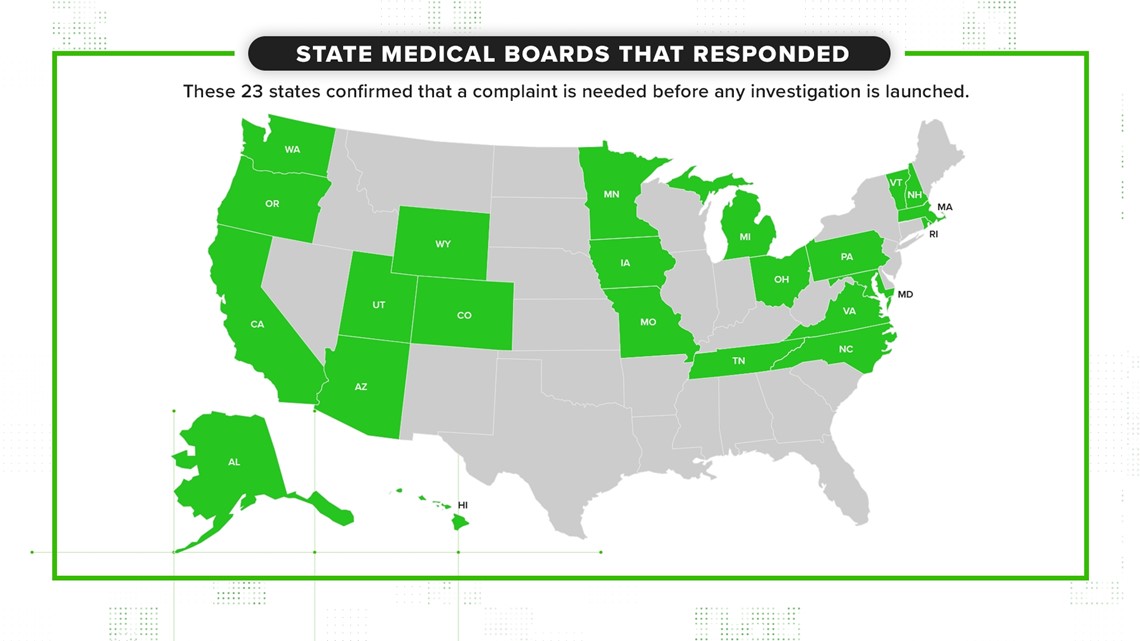
During the pandemic, some doctors were penalized for spreading false information under these state systems. For example, in April 2021, Mark Brody, M.D., a Rhode Island-based doctor, had his medical license suspended for five years for making “patently false” statements to his patients. According to the State of Rhode Island Department of Health, Brody sent an unsolicited letter to his patients saying his office would not be administering any COVID-19 vaccines. In the letter, Brody told his patients that the vaccine could cause infertility for all women who receive it.
In the letter, Brody told his patients that the vaccine could cause infertility for all women who receive it.
The vaccines do not cause infertility.
Meryl J. Nass, M.D., an internist, was disciplined by the Maine state medical board for prescribing non-FDA-approved COVID-19 treatments hydroxychloroquine and ivermectin. According to the findings from the licensing board, she was also accused of spreading false claims about COVID-19 treatments and vaccination. Nass made false claims in a video interview and on her website, and on one occasion, purposely misdiagnosed a patient in order to get them hydroxychloroquine to treat COVID-19, the findings from the board said. Her license was suspended for 30 days, and she was ordered to undergo a neurological evaluation.
Social media, often a breeding ground for false claims, can also play a role in these investigations. State medical boards do not independently monitor the social media accounts of physicians licensed in their jurisdiction, but social media accounts or posts can be taken into consideration by the governing board during an investigation depending on the circumstances behind the complaint.
MISINFORMATION ON SOCIAL MEDIA ‘URGENT THREAT’ TO PUBLIC HEALTH
In 2021, U.S. Surgeon General Vivek Murthy, M.D., warned of the continued harm of medical disinformation and misinformation in an official health advisory. Murthy wrote specifically about the prevalence of medical misinformation across social networking platforms, saying the spread of misinformation across social media has become an “urgent threat” to public health.
“Misinformation is often framed in a sensational and emotional manner that can connect viscerally, distort memory, align with cognitive biases, and heighten psychological responses such as anxiety. People can feel a sense of urgency to react to and share emotionally charged misinformation with others, enabling it to spread quickly and go ‘viral,’” the advisory said.
This ability to quickly hit the share button has turned social media into a kind of medical disinformation or misinformation battlefield, David Morens, M.D., told VERIFY. Morens is the senior advisor to Anthony Fauci, M.D., at the National Institute of Allergy and Infectious Diseases.
Morens said when a trusted individual, like a doctor, makes a claim online, people scrolling by may be more likely to accept it as fact, rather than doing the research themselves.
“If somebody has an M.D. against their name, people are likely to believe them. And in general, that's true, you should trust your physician. But even if there's only one in a million physicians who are dishonest and dishonorable, and they get a bully pulpit and they get on TV, they can do an enormous amount of harm,” Morens told VERIFY. “[The public] has to be able to navigate a world in which the truth is a needle buried in a whole haystack of lies and half truths. Particularly on social media.”
“They network with their friends on Facebook, and their friend from high school has a girlfriend who said their milkman said, ‘This is true. And that is true.’ And they don't fact check,” he said. “So in a system where everybody is spreading around ideas, and you can't trace the factoid that you get to its source to verify whether it's true, it's very easy for false information to get in there either accidentally or purposely.”
In early January 2022, Robert Malone, M.D., a principal founder of mRNA technology, was banned from Twitter for violating the platform’s COVID-19 misinformation policies. At the time of the suspension, Malone had more than 440,000 followers on Twitter, an archive of the account showed.
When asked about spreading “misinformation” online, Malone told VERIFY in an email: “One issue with speaking about science and regulatory policy in a detailed and complex manner, as well as posting on my quarter million person Twitter feed is that I can not control how people use or misuse what I say or write. I post science articles, analysis, regulatory documents - these are easily mis-understood. But it is my belief that it is important that the public have this knowledge. We live in a democracy and we deserve transparency in our regulatory bodies, our politicians and from our scientists.”
Many of his claims have been widely disputed. For example, a TikTok video went viral that showed Malone saying spike proteins in the vaccine are toxic. This claim has been debunked by fact-checking organizations like VERIFY, Reuters and USA Today.
It has been difficult for social media platforms to take action against disinformation or misinformation since the beginning of the COVID-19 pandemic, Ciaran O’Connor, an analyst with the Institute for Strategic Dialogue, told VERIFY. He said individuals who spread misinformation or disinformation are highly adept at using social media and have increased their reach to unmoderated online spaces, which makes their false content harder to find.
“What this really often means is that these platforms have little to no community guidelines, no rules on medical misinformation. And essentially, what you find on these platforms is that dangerous, misleading claims run wild; people who were removed from other platforms for making potentially harmful claims have these platforms as their go-to now and they're attracting audiences … And within these less moderated spaces, there's further chance for extremism or for radicalization, or for these kinds of dangerous branches of misinformation,” O’Connor told VERIFY.
Ayobami Olugbemiga, a spokesperson for Meta, the parent company of Facebook, told VERIFY since the start of the pandemic, the platform has removed 24 million pieces of COVID misinformation, and labeled more than 195 million pieces of COVID content rated by Facebook’s fact-checking partners.
Olugbemiga referred VERIFY to Meta’s policies on misinformation.
On Twitter, from January 2020 through July 2021, the company said more than 2,000 accounts were suspended and 59,800 pieces of COVID-19 misinformation content removed. Twitter did not reply to VERIFY’s request for comment.
From February 2020 through Aug. 25, 2021, YouTube announced it removed over 1 million videos that spread medical misinformation or disinformation. YouTube’s COVID-19 medical misinformation policy can be found here. YouTube did not reply to VERIFY’s request for comment.
In addition to the official policies on these platforms, there are still steps individuals can take to fact-check viral claims.
MOVING FORWARD: HOW TO SPOT MISINFORMATION
Thomas Friedrich, M.D., is an expert on evolution, immunity, and disease processes of pandemic viruses at University of Wisconsin-Madison. He told VERIFY the COVID-19 pandemic is a collective-action, community-level problem that needs a similar type of solution. He says medical misinformation or disinformation is especially harmful “when it prevents people from doing things that could help them.”
Limiting the spread of health misinformation is a “moral and civic imperative that will require a whole-of-society effort,” U.S. Surgeon General Vivek Murthy said. This requires individuals to work together to stop the spread of false claims. There are also resources available to stay diligent and alert when it comes to sharing information.

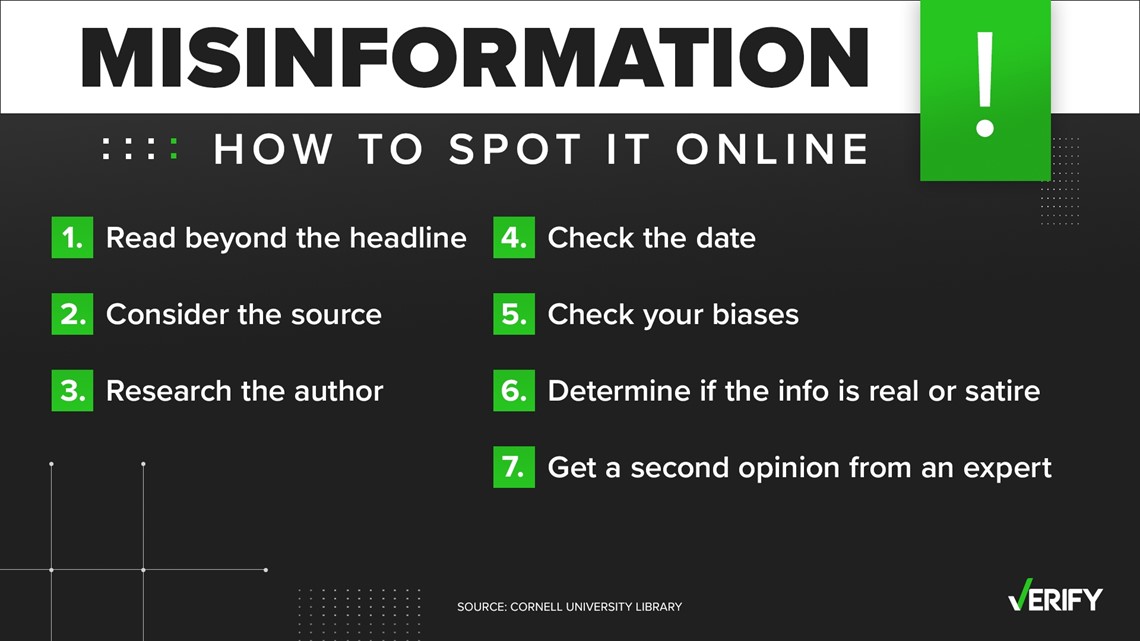
Cornell University provided a comprehensive list of what individuals can do to spot “fake news” and misinformation on the internet. The list says:
- Consider the Source - Click away from the story to investigate the site, its mission and its contact info.
- Read Beyond - Headlines can be outrageous in an effort to get clicks. What's the whole story?
- Check the Author - Do a quick search on the author. Are they credible? Are they real?
- Supporting Sources? - Click on those links. Determine if the info given actually supports the story.
- Check the Date - Reposting old news stories doesn't mean they're relevant to current events.
- Is it a Joke? - If it is too outlandish, it might be satire. Research the site and author to be sure.
- Check your Biases - Consider if your own beliefs could affect your judgment.
- Ask the Experts - Ask a librarian or consult a fact-checking site.
Friedrich recommends doing your own research when you see a claim. For instance, reading up on information in peer-reviewed scientific journals, or finding sources of journalism that cover peer-reviewed science. The U.S. Department of Health and Human Services also issued an advisory with tips to spot health misinformation.
If you spot a piece of false information on social media, each social networking platform has their own process for flagging potentially false information.

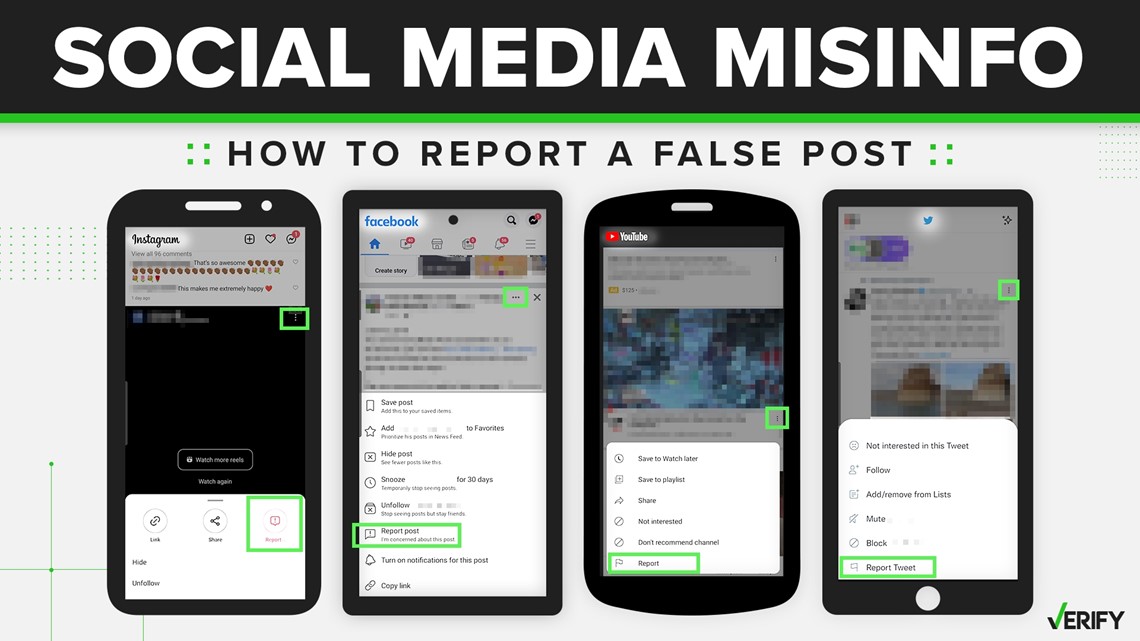
When it comes to disinformation or misinformation spread by medical professionals, there’s not one easy way to report it. To file a complaint or request an investigation into a licensed medical professional in your state, consult your state’s medical board.
And don’t forget, if you have questions or want something confirmed, that is what the VERIFY team is here for. Send your questions to questions@verifythis.com if you want the team to fact-check any claims you see online or hear in person.

